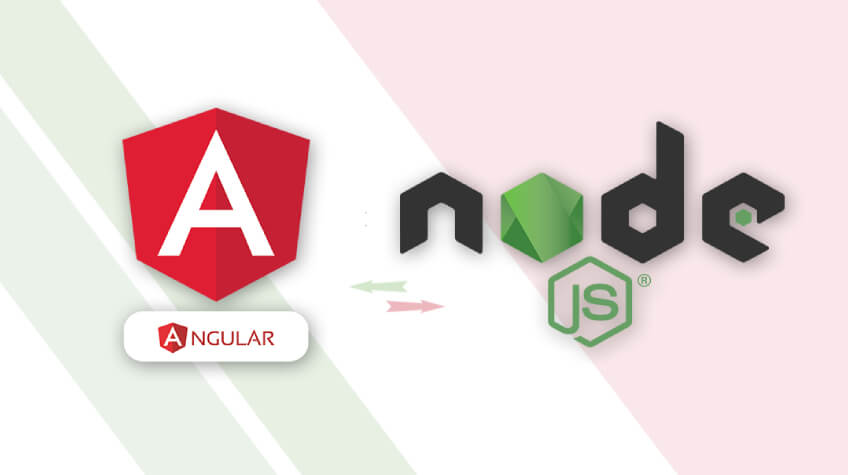
JavaScript is a text-based programming language and has ruled the web development industry for more than 2 decades. It consists of at least 24 JS frameworks and around 83 libraries that are hard to select the right one for your project.
As a developer, you always need to approach the best frameworks that suit your web development and applications. Nowadays, the debate of Node.JS vs Angular.JS is strongly battling among JS platforms in 2024.
If you are someone who is looking for the detailed difference between Node JS and Angular JS in a simple and understanding format, then you are at the right place. Here we are going to discuss the categories that differentiate the architecture, functionalities, performances, and usage from each other.
What is Node JS And Angular JS:
Node.JS: Node.JS is an open-source, cross-platform runtime environment that enables the development of server-side by executing the JS code outside the web browser.
The initial release of this framework was on 27 May 2009 intending to produce vigorous page content before the page that is conveyed to the browser. Today, Node.JS is used by at least 30 million websites and can be more. Thus, in this huge competition, finding the best NodeJS developers and hiring them is a painful task for the company.
Angular.JS: Angular.JS is a structural framework used to make dynamic web applications based on MVC i.e., model-view-controller patterns. It is an open-source framework developed on 20 October 2010 and maintained by Google.
Nowadays, almost 368,653 websites are using Angular.JS frameworks. As it can create compound and complex products as per the business requirements, Angular is becoming more and more popular among web applications development.
Difference between Node JS and Angular JS: Overview
► Node.JS
- If you are looking to develop streaming applications, server-side apps, or microservices, Node.JS can be your better choice.
- As Node.JS is a single-threaded process, scalability is a bit more complicated.
- Node.JS provides a collection of features that requires building server-side and networking applications.
- Node.JS allows developers to use asynchronous APIs and a single-threaded event mechanism for better code execution and higher speed.
- Node.Js is a back-end framework used to write business logic.
- The programs are written in C, C++, and JavaScript.
- It uses the JavaScript V8 engine to execute codes and increase its speed.
► Angular.JS
- If you are aiming to develop scalable and complex applications, you should go for Angular.
- Angular comes with a strong scalable infrastructure that provides support for Google’s some of the larger applications.
- Angular.JS enables you to use HTML as a template language that manages the client-side applications.
- Angular.JS helps the developers to simplify the development of dynamic and single-page web applications by providing features like filters, data binding, scope, directives, and so on.
- Angular is a front-end framework used to create an intuitive user interface.
- The programs are completely written in JavaScript.
- It uses Plain Old JavaScript Objects (POJO) to monitor the flow of data.
Now, let us dive directly into the details of the difference between Node.JS and Angular.JS.
Difference between Node JS and Angular JS: Details
Core Architecture:
Node.Js is an open-source server-side platform built on Google Chrome’s JavaScript Engine for fast building and scalable networks. Similarly, Angular.JS is an open-source client-side JavaScript and TypeScript framework that is entirely based on HTML and JavaScript.
Angular.JS uses POJO (Plain Old JavaScript Objects) to analyze data flow without any restrictions while Node.JS offers a rich library of JavaScript Modules to simplify the development of web applications to a huge extent.
Node.JS is an asynchronous (Non-blocking) and event-driven JavaScript that is designed to build scalable network applications while Angular.JS is a structural framework that uses HTML template language to extend HTML’s syntax. It helps to express your application’s components clearly.
Core Intention:
With the help of simple coding, Node.JS helps to run JavaScript applications outside the browser. On the other hand, Angular.JS is a structural framework that provides support to develop dynamic and single-page web applications.
Furthermore, the user interface of Node.JS intends to make the working process lightweight and efficient while Angular.JS intends to ease the management of components with the help of its well-organized structure.
Features:
Node.JS:
Node.JS library offers a non-blocking facility to its server so that without waiting for a response, the server can directly move to the next API after calling it.
The notification mechanism of Node.JS events helps the server to avoid waiting for an API to return data and gets a quick response from a previous API call.
Because of the Google Chrome V8 JavaScript Engine, code execution proceeds quickly in the Node.JS library.
No buffering feature of Node.JS never lets the application’s data buffer and creates the output in chunks.
Angular.JS:
Angular.JS offers two-way data binding to manage the harmonization in the middle of DOM (Document Object Model) and makes the model simple.
MVC i.e., Model-View-Controller is an essential feature of Angular as it slots the designs and provides clear-cut data and schemes to maintain specific views.
The dependency injection system helps you to keep the applications simple and test manually.
With the help of directives, Angular.JS builds custom HTML tags that describe it as a custom widget.
Directives assemble the components to drive DOM traits in an efficient engaging manner.
Programming language:
Both Node.JS and Angular.JS are using JavaScript as their basic language. But after the advancement, these frameworks have started supporting the other programming languages that enable the web application other than JavaScript.
Node.JS supports CoffeeScript, Ruby, TypeScripts, and ClojureScript while Angular.JS uses HTML and TypeScript. Angular also enables HTML syntax that describes the application components whereas Node.JS supports non-blocking input/output API.
Applications and usage:
According to the StackOverflow survey, 49.6% of the respondents have voted Node.JS as the most commonly used technology, while 36.9% prefer Angular.JS instead.
Main benefits:
Node.js:
- As it is scalable, you can use this framework for both horizontal as well as vertical scaling purposes.
- It supports all kinds of unit testing. So you can use any of the JavaScript unit testings to test Node.JS codes.
- It is a high-performance tool that helps to execute speed codes in applications.
- Here, API ( Application Programming Interfaces) helps you to build different types of servers.
- As it supports a few other languages like C and C++, so any developer can easily work using this framework.
Angular.JS:
- As it is a typescript framework, codes are written and implemented easily.
- DOM (Document Object Models) methodology is used to enhance performance and testability.
- Here, the MVC is liable to set the preface and enhance the capacity and techniques that manage the behaviour of applications.
- As it is purely based on HTML and JavaScript, so you don’t need to learn any other language.
Read also: The Advantages of Using Node.js for Building APIs
List of the Companies using Frameworks:
► Companies run on Node.JS
• Uber
• NASA
• Linkedin
• Trello
• PayPal
• Netflix
• Godaddy
• Mozilla
• Groupon
• Walmart
• Medium
• eBay
• Walmart
► Companies run on Angular.JS
• Deutsche Bank
• Upwork
• Freelancer
• Weather
• IBM
• PayPal
• Forbes
• Delta
• The Guardian
• Samsung
• Microsoft Office
• Mixer
• Gmail
• Overleaf
What should you Prefer: Node JS or Angular JS
Angular is a profitable area that continues to gain popularity among users. It is reasonable to choose this framework to conquer an upcoming milestone in new product development for a good solution.
On the other hand, Node.JS in 2024 also seems to be a massive trend that will evolve even more. As it offers some undeniable benefits, it has become the best choice for software developers.
In general, both of them are good enough to use for web development projects by any firm. These differentiate can not justify the popularity and significantly bottleneck the outcomes of the applications.






